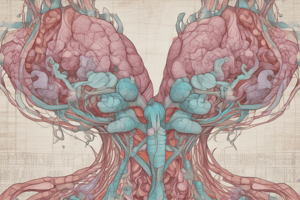Podcast
Questions and Answers
Which of the following is NOT a function of growth hormone?
Which of the following is NOT a function of growth hormone?
- Promotes bone and cartilage growth
- Stimulates uptake of amino acids
- Stimulates breakdown of fats for energy
- Regulates blood levels of insulin (correct)
What is the role of the anterior pituitary in hormone regulation?
What is the role of the anterior pituitary in hormone regulation?
- To convert cholesterol to pregnenolone
- To produce thyroid hormone
- To synthesize insulin
- To secrete tropic hormones that stimulate target cells (correct)
Which type of feedback mechanism is involved in the regulation of oxytocin secretion?
Which type of feedback mechanism is involved in the regulation of oxytocin secretion?
- Negative feedback
- Feedforward regulation
- Positive feedback (correct)
- Up-regulation
What is the effect of growth hormone on the liver and skeletal muscle?
What is the effect of growth hormone on the liver and skeletal muscle?
Which of the following is an example of negative feedback?
Which of the following is an example of negative feedback?
What is the target cell for growth hormone?
What is the target cell for growth hormone?
Which hormone is involved in the ejection of milk from lactating breasts?
Which hormone is involved in the ejection of milk from lactating breasts?
What is the effect of growth hormone on protein synthesis?
What is the effect of growth hormone on protein synthesis?
Which of the following is a function of the hypothalamus in hormone regulation?
Which of the following is a function of the hypothalamus in hormone regulation?
What is the role of IGF-1 in growth hormone regulation?
What is the role of IGF-1 in growth hormone regulation?
Flashcards are hidden until you start studying
Study Notes
Thyroid Gland
- One of the largest endocrine glands, highly vascular, and the only gland that stores hormone.
- Composed of follicles with follicular cells surrounding thyroglobulin/thyroid hormones.
- Iodine and tyrosine are necessary for the production of T3 and T4.
- T3 and T4 increase the rate of glucose, fat, and protein metabolism in many tissues, thus increasing body temperature and promoting normal growth of many tissues.
ACTH
- ACTH (Adrenocorticotrophic hormone) is released by the anterior pituitary.
- ACTH causes cortisol secretion from the adrenal cortex (a glucocorticoid).
- ACTH causes aldosterone secretion from the adrenal cortex (a mineralocorticoid).
- ACTH also causes androgen (a weak sex hormone) secretion.
Adrenal Medulla
- Epinephrine and norepinephrine are secreted by the adrenal medulla in response to stress, physical activity, and low blood glucose levels.
- These hormones increase heart rate and force of contraction and cause blood vessels to constrict in skin, kidneys, gastrointestinal tract, and other viscera.
Hypothalamic Hormones
- Growth hormone-releasing hormone (GHRH) causes increased secretion of GH.
- Growth hormone-inhibiting hormone (GHIH) causes decreased secretion of GH.
- Thyrotropin-releasing hormone (TRH) causes TSH secretion.
- Melanocyte-releasing hormone (MRH) causes MSH secretion.
- Corticotropin-releasing hormone (CRH) causes ACTH secretion.
- Gonadotropin-releasing hormone (GnRH) causes secretion of gonadotropins LH and FSH.
- Prolactin-releasing hormone (PRH) causes increased prolactin secretion.
- Dopamine (prolactin-inhibiting hormone, PIH) causes decreased prolactin secretion.
Anterior Pituitary Hormones
- Growth hormone (GH) acts on most cells of the body, regulating overall metabolism and growth.
- Thyroid-stimulating hormone (TSH) stimulates the thyroid to secrete T3 and T4.
- Adrenocorticotropic hormone (ACTH) stimulates the adrenal cortex to secrete cortisol and aldosterone.
- Oxytocin stimulates uterine contractions during birth and ejection of milk from lactating breast (letdown reflex).
Control of Hormone Secretion
- Negative feedback: the hormone from the target endocrine cell travels to the hypothalamus and anterior pituitary, decreasing secretion of the tropic hormone.
- Positive feedback: the hormone from the target endocrine cell travels to the hypothalamus and anterior pituitary, increasing secretion of the tropic hormone.
Growth Hormone
- Stimulates uptake of amino acids and protein synthesis.
- Stimulates breakdown of fats to be used as an energy source.
- Promotes bone and cartilage growth.
- Regulates blood levels of nutrients after a meal.
- GH stimulates liver and skeletal muscle to make IGF-1.
Studying That Suits You
Use AI to generate personalized quizzes and flashcards to suit your learning preferences.




